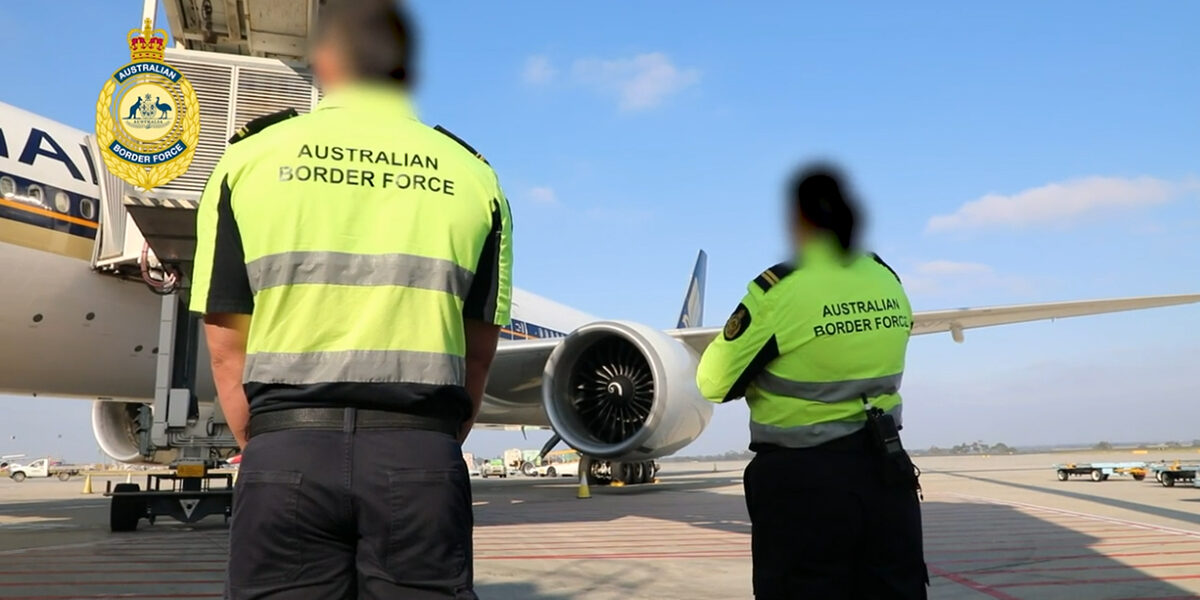Operation JETENGINE disrupts criminal activity at Melbourne Airport
The Australian Border Force (ABF) and partner agencies have placed trusted insiders firmly on notice with a high-visibility disruption operation across Melbourne International Airport.
Operation JETENGINE aims to identify, monitor and disrupt criminality within the aviation supply chain across Victoria and Tasmania.
ABF officers working in Air Border Security teams at Melbourne International Airport are alert to aviation employees who access customs-controlled areas without authorisation – to exploit their trusted positions at airports – for the purpose of conducting criminal activity.
Air Border Security officers are highly skilled and trained to detect vulnerabilities in the aviation supply chain by utilising advanced tools and technology to detect and disrupt criminal activity.
Over the past 12 months under Operation JETENGINE, officers have:
- attended and inspected over 1,300 arriving and departing commercial aircraft;
- examined up to 500 airline crew and employees;
- conducted more than 1000 vehicle and foot patrols; and
- checked more than 350 Aviation Security Identification Card (ASIC) holders, identifying 70 breaches.
During the operation, officers also uncovered evidence of a number of airline crew members engaged in illicit drug use as well as the domestic distribution of illicit substances.
Throughout the same period, international airline crew members have been detected with illicit cigarettes and tobacco products, discovered within false bottom suitcases, in an attempt to evade significant amounts of duty.
In some cases, international crew members were detected attempting to smuggle high valuable dutiable goods and undeclared currency, an offence under Anti-Money Laundering and Counter-Terrorism Financing legislation.
Two international crew members were detected under the influence of illicit substances while on duty, leading to the cancellation of at least one international crew travel authority (visa).
The ABF has also completed in excess of 1000 foot patrols within the airport precinct and surrounding areas, leading to the detection of aviation security vulnerabilities and the removal of a squatter from an abandoned building.
Furthermore, over 1300 search activities have been undertaken on aircraft both arriving and departing Melbourne International Airport to ensure the effective compliance of various restricted items that remain subject to customs control.
This has also included searches of aircraft arriving from overseas to detect any goods concealed within sensitive areas including, flight decks, sleeping cabins and cargo spaces.
Building on the importance of stakeholder relationships, the ABF has hosted more than 70 industry engagements designed to provide education, foster relationships and encourage the reporting of suspected criminal activity in the aviation environment.
ABF Superintendent Kelly-anne Parish said Operation JETENGINE activity remains ongoing with a number of referrals to domestic and international law enforcement partners regarding individuals who continue to pose a threat in the aviation environment, due to their links with trans-national organised crime groups.
“Our officers are committed to detecting, deterring and disrupting criminal activity in the aviation environment through world’s best practice activity, intelligence and training,” Superintendent Parish said.
“ABF officers are called upon for their expertise recognised by international law enforcement partners and more recently have been working closely with the World Customs Organization (WCO) to establish a best practice approach in tackling the threat of trusted insiders at airports.
“They work closely with Industry who have an invested interest in protecting and securing the aviation supply chain and are pivotal to safeguarding this environment.
“Ensuring a safe environment from criminal exploitation of the aviation supply chain for the Australian community and those who work in the aviation industry is a top priority for the ABF, and I strongly encourage those working in the aviation industry or members of the public who have information of persons conducting criminal activity at airports to report it.”




